Kevin Clarke
Operetta Research Center
8 November, 2022
It’s a new dawn in Leipzig. The opera company has a new director, Tobias Wolff, who opened his first season by highlighting Albert Lortzing and by giving us his forgotten masterwork Undine. At Musikalische Komödie, which is part of the Leipzig opera company, the opening production was Leo Fall’s Dollarprinzessin, heralded here as a “rarity” and “discovery” – presented with new talent brought to Leipzig by Mr. Wolff.
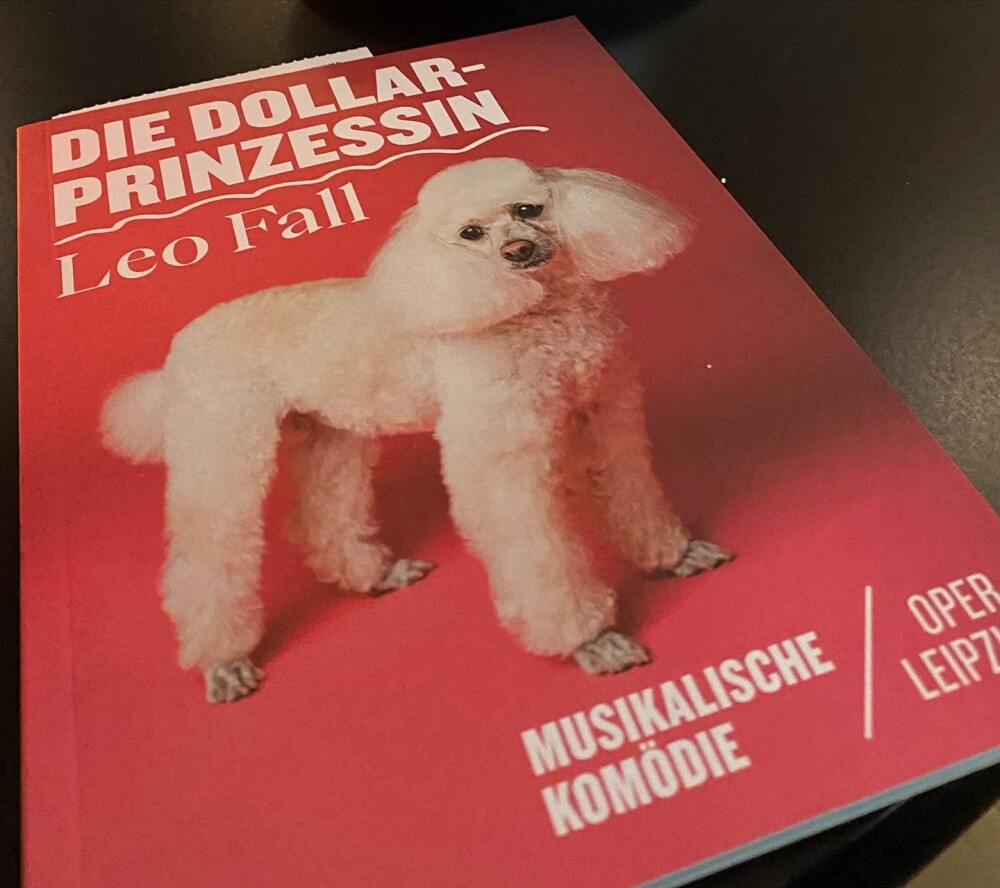
The program booklet for “Dollarprinzessin” at Musikalische Komödie Leipzig. (Photo: Private)
Labelling Dollarprinzessin a discovery is interesting, because it demonstrates that this once super successful composer and even his top hits are not familiar anymore (for more biographical information on Leo Fall, click here). The 1907 Dollarprinzessin is one of the shows that presented the “modern world” of the USA, a land where old fashioned European things such as aristocratic titles don’t matter, instead wealth determines who you are. And if you have enough money – as billionaire John Couder and his daughter Alice have – you can hire impoverished European aristocrats “for fun” as servants, riding instructors, personal secretaries, whatever you find amusing. (Even as shoe-shining boys.) It’s a social farce that hasn’t lost any of its bite.
On top of this, it’s also a feminist tale, because with enough money to throw around, Alice Couder isn’t going to let any man tell her what to do. She considers herself a self-made woman who invests her own fortune on the stock market, runs her own office, bosses her own staff around, and demands the same respect as any man gets.
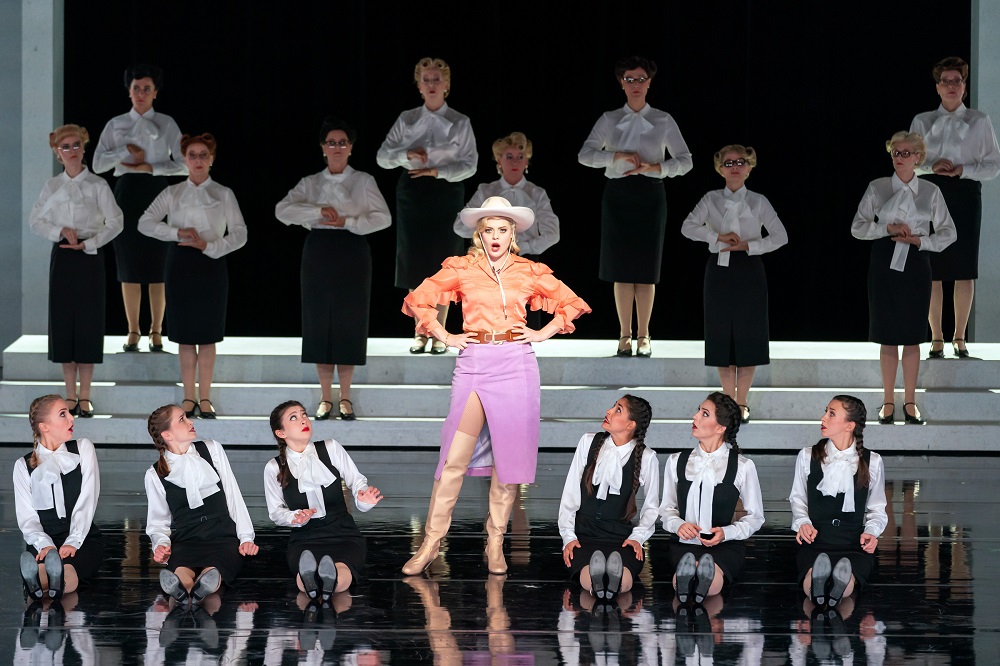
Nicole Lubinger as Alice Couder with her secretaries in “Dollarprinzessin”. (Photo: Tom Schulze / Oper Leipzig)
Putting the story of the Couders on stage today – with the glorious Leo Fall music as your guide – should be a fun exercise. But the young stage director Matthias Reichwald, in his first operetta outing, seems to have problems with taking this story seriously. Instead of showing us a detailed social satire – that dares to lovingly ridicule everyone – Mr. Reichwald ignores the social hierarchies in the story, he lets the characters move around aimlessly most of the time in fantasy costumes (by Tanja Liebermann) in fantasy sets (by Jelena Nagorni). Nothing is ever clearly defined.
For example, when we see the busy working life in an office in the first scene, where secretaries are manically typing away, sending letters and invoices around the world, we get some sort of “ballet” (choreography by Claudio Valentim) in which the ladies sit on the floor and pretend to type. There’s no office, there’s no feeling of “work”, there’s no differentiation between the determined secretaries, representing the ideal of the “new woman”, the rest of the staff, and the management (i.e. Alice Couder).

Nicole Lubinger as Alice and Adam Sanchez as Fredy in “Dollarprinzessin”. (Photo: Tom Schulze / Oper Leipzig)
Does Mr. Reichwald believe that operetta stories are not real stories? And that operetta characters don’t need to be fully drawn? In this staging, the various characters come on, sing their song, leave, come back in a new outfit, sing a duet, and leave again. Anything you might call “acting” or “interacting” is only happening on a basic level. The cast assembled is not one of actors anyway, they are all classically trained singers.
So you get, as a new soprano in Leipzig, Nicole Lubinger as Alice, singing with a strong voice and some lovely sotto voce in between, playing the billionaire daughter like an shop window dummy. She’s imposing to look at and listen to, but one dimensional. When her love story with the European aristocrat Fredy Wehrburg (Adam Sanchez) unfolds, both are hardly given anything to do.
In a wonderful scene in which she forces him, as her private secretary, to type a fake love letter to an invented suitor, he just dances around her with a typing machine, without ever behaving like a private secretary, or a jealous person who is desperate to win over a billionaire. As Mr. Sanchez plays him, this Fredy Wehrburg is an operetta tenor who walks on, looks dashingly, sings impressively, and walks off again. He should have watched Crazy Rich Asians to get an idea what comic potential his character offers and the situations he lands in.
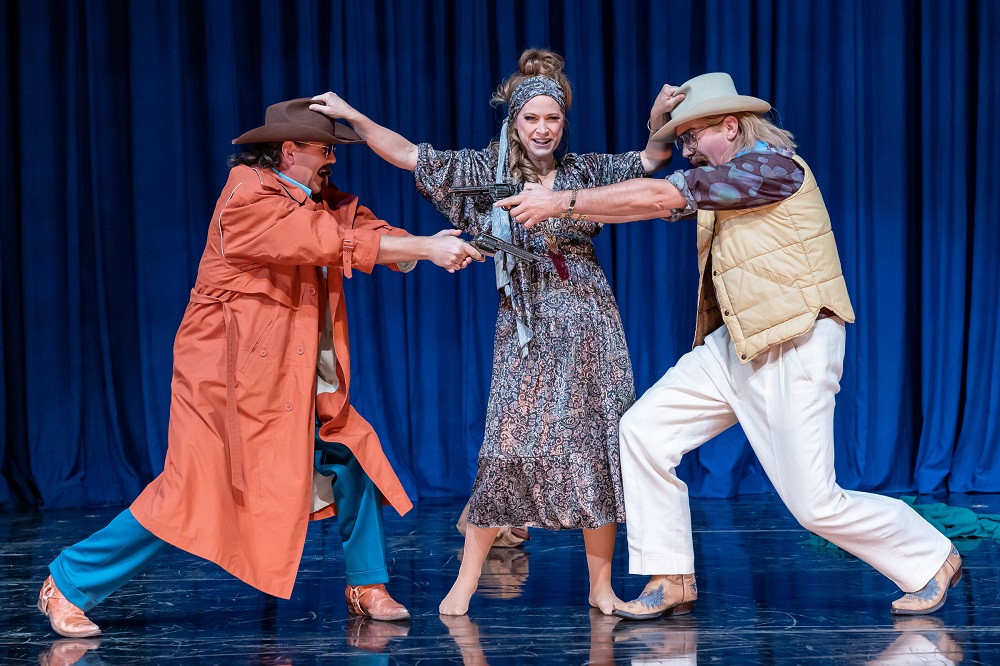
Nora Lentner as Olga in “Dollarprinzessin”. (Photo: Tom Schulze / Oper Leipzig)
Your reaction to all of this will depend on what your expectations regarding operetta are. This new Dollarprinzessin looks and sounds like any standard operetta production at German opera houses (for example the recent Lustige Witwe at Oper Dortmund). Compared with companies such as Ohio Light Opera you could say that, here, there’s a bigger and better orchestra (conducted by Friedrich Praetorius, alternating with Tobias Engeli). You could also say that the singers all possess impressive professional voices, but no one ever tries to interpret the witty text by Alfred Willner and Fritz Grünbaum (both famous cabaret authors) with anything like “nuance”.
In a way, you could call this “traditional”, it’s how operetta has been mostly performed for the past 40 years at opera companies. And if you haven’t been exposed to the likes of Dagmar Manzel, Katharine Mehrling, Max Hopp, Jonas Dassler or Geschwister Pfister, you might not even notice that something is missing. But Musikalische Komödie is one of only three companies in Germany specialized in this genre … So I, for one, expect more than the “standard” way of doing things. A company like MuKo – or Staatsoperette Dresden and Gärtnerplatztheater Munich - could point the way in new directions, whatever those might be. Just like the Bayreuth Festival claims to be trendsetter in matters Wagnerian, so MuKo & Co. should profile themselves as the best of the best in their field. (What else are they there for, otherwise?)
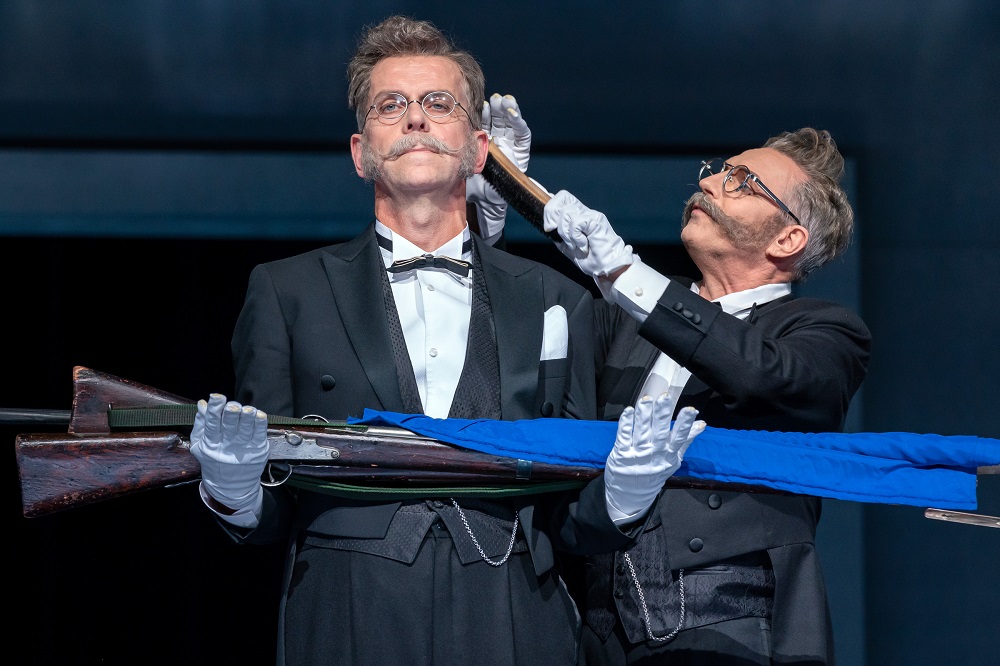
Stefan Ebeling and Armin Zarbock as the comedy due Graf & Herzog in “Dollarprinzessin”. (Photo: Tom Schulze / Oper Leipzig)
I met up with two Spanish operetta experts in Leipzig, both passionate Leo Fall lovers and fans of Dollarprinzessin. They were enthusiastic because, for them, it was the first chance to hear the full score with full orchestra live, with powerful voices (no microphones) and see it all on stage. There were no supertitles, neither in German nor English, so my two Spanish friends were a little lost in between. Because, as I said, Mr. Reichwald is often not clear about showing what is happing, in terms of story. He prefers to present his “associations” – arranged as a dance tableaux.
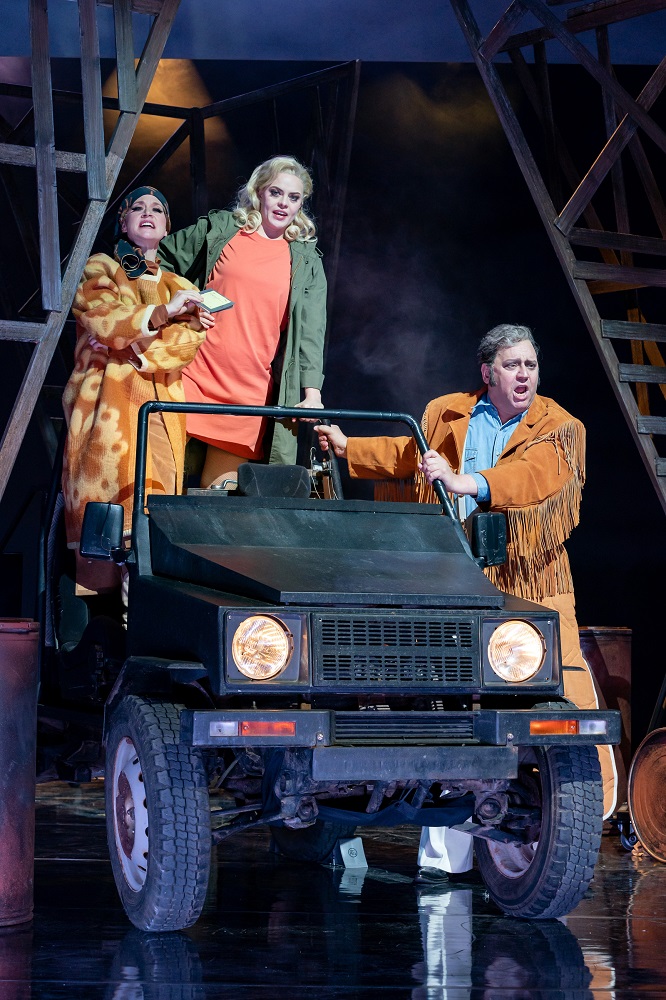
The Couder family arriving in Kanada for the finale of “Dollarprinzessin”. (Photo: Tom Schulze / Oper Leipzig)
At the end, when Alice and Fredy finally come together, Mr. Reichwald wants to show us that such a finale is unbelievable, considering Alice Couder’s independence as a woman. So instead of sending the soprano and tenor to their honeymoon, we get a new finale in which the fabulous Nora Lentner (formerly “Olga von der Wolga” in the show) comes on stage in a tux, as a newly independently wealthy woman, with her own female football team, and invites Alice to join her new “feminist” world in Canada. During the final chords – to the song “Gut geht’s Kanada” by Harry Ralton and Fritz Rotter – a flag is brought on stage, in the colors of the trans and queer-feminist movement.
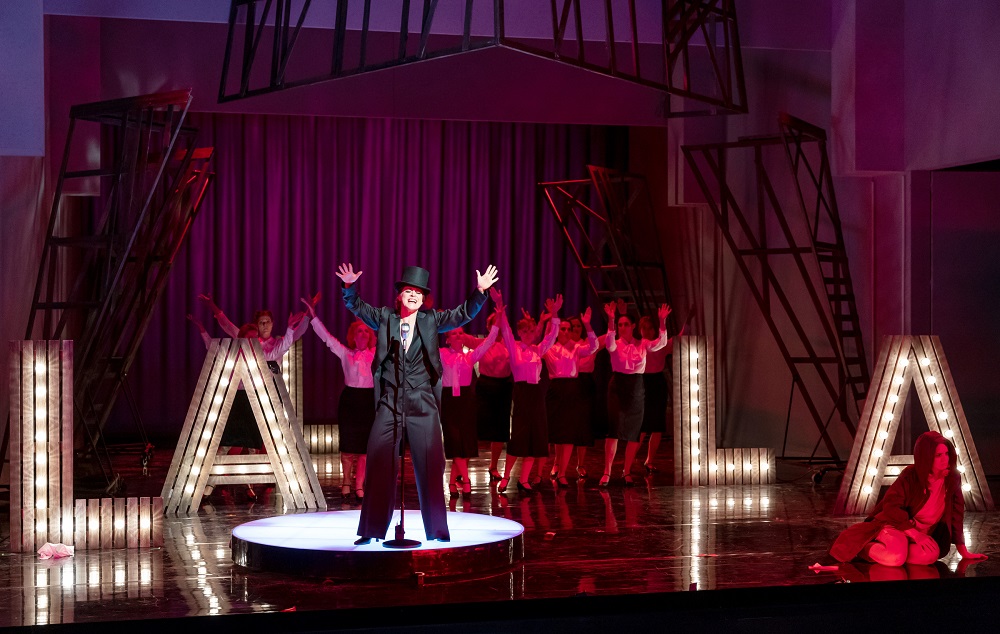
Part 1 of the new ending of “Dollarprinzessin”. (Photo: Tom Schulze / Oper Leipzig)
A true “feminist” reading of Dollarprinzessin would have been fascinating, no question about that, also an emphasis on trans issues. But, in my opinion, that should have started much earlier, right in scene one of act one. Where are the trans characters in this tale of emancipation? Could Musikalische Komödie have cast Dollarprinzessin in the same way as 1776 has just been cast on Broadway, with women, trans actors and non-binaries?
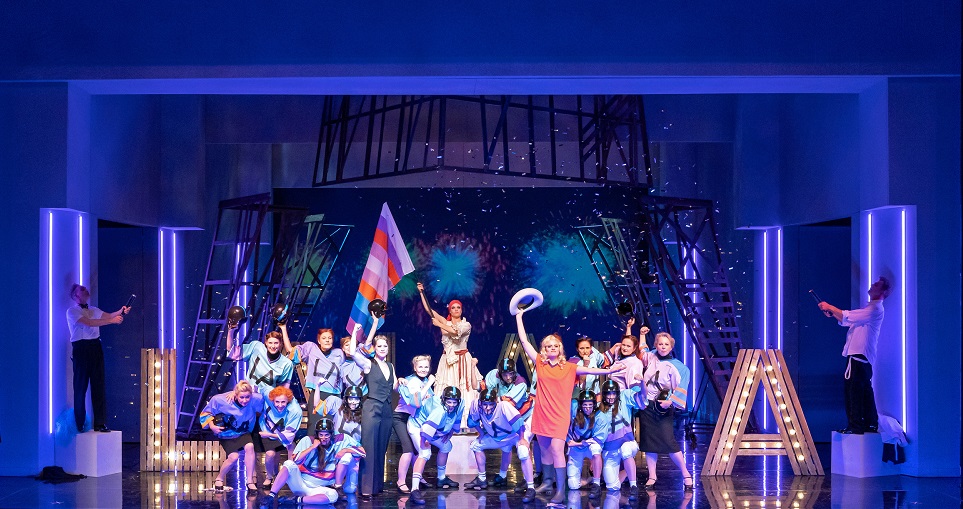
Part 2 of the new feminist ending of “Dollarprinzessin.” (Photo: Tom Schulze / Oper Leipzig)
And was it really wise to start the show with the opulent title music from the tv series Dynasty in a sort of pantomime opening, with the two servants played by Stefan Ebeling and Armin Zarbock? Would Alice and her cousin Daisy (Alina König Rannenberg) have been more effective if they’d copied Alexis Carrington and Sammy Jo Dean Carrinton? Or, for that matter, if Milko Milev as John Couder had been more like John Forsythe as Blake Carrington? Or Jeffrey Krueger as Hans Freiherr von Schlick more like Dex Dexter or Jeff Colby? Why quote Dynasty at all and then not do anything with that reference for the rest of the three acts?
As you can see, many questions remain. I asked Tobias Wolff before the performance if Leo Fall will be a focus of his company for the next seasons, just like Albert Lortzing will be a focus for the opera company in Leipzig. The answer is: no. This Dollarprinzessin was a one-off Leo Fall experiment, for which Mr. Wolff brought Mr. Reichwald to Musikalische Komödie as a “new” artist in operetta land. Whether Mr. Reichwald will do more operettas in the future remains to be seen.
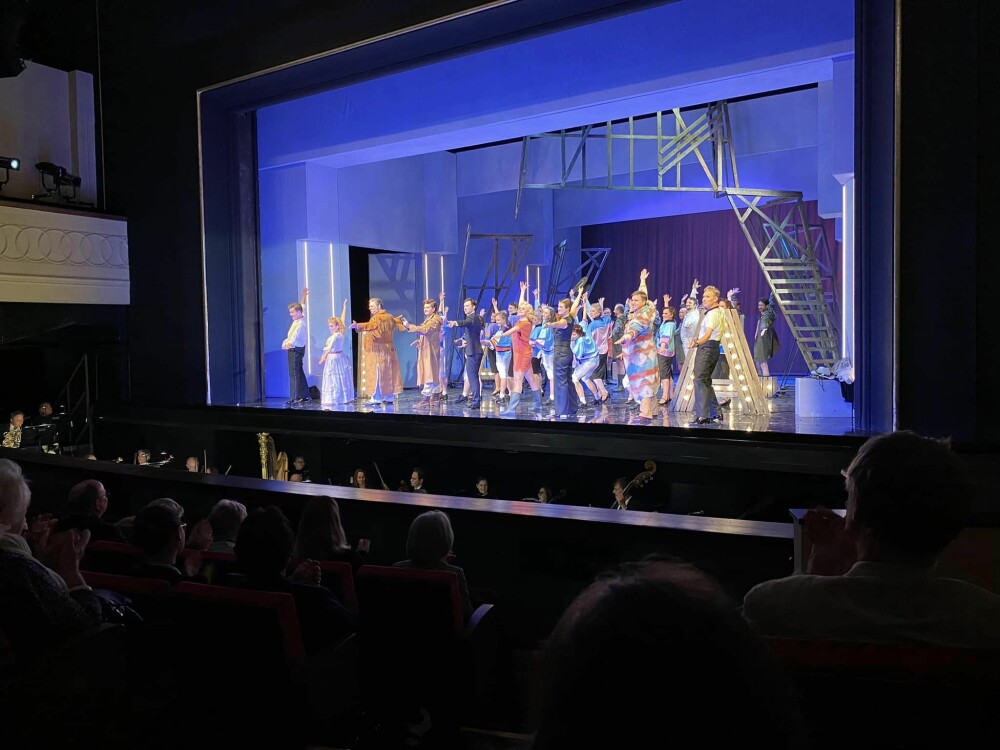
Curtain calls after the “Dollarprinzessin” performance. (Photo: Private)
Because the company is still looking for a new musical director for the operetta/musical house in Lindenau, no definite plans have been made for what sort of programming we can expect in the future. Obviously, that will depend on who takes over the musical direction and on what his or her preferences/specialties are.
What Mr. Wolff did tell me, was that there will be a focus on “classic” operettas and musical comedy titles that are known to audiences in Leipzig and beyond. So the standard repertoire will get a refresher in Leipzig over the next years.
If you want to know what Dollarprinzessin once looked like, in Vienna and beyond, one of the Spanish operetta researchers, Ignacio Jassa Haro, has put together a photo gallery that’s worth scrolling through. Just for inspiration.
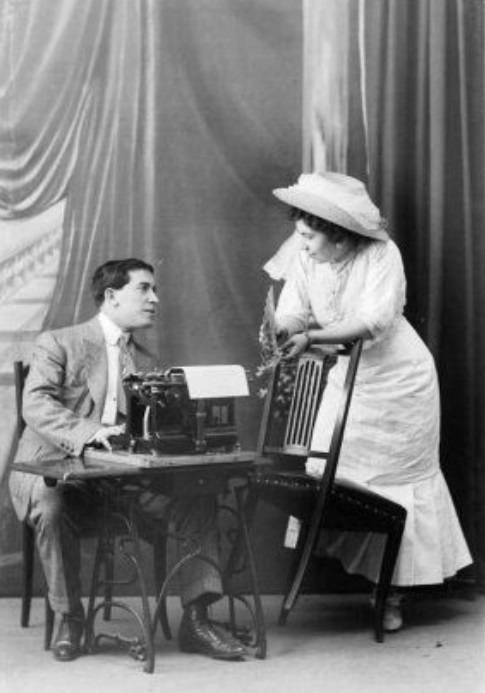
Teresita Ydel as Alicia and Enrique Ramos as Fedy in 1909, at the Teatro Nuevo in Barcelona. (Photo: Pinterest.es / Icono Talía)
And, of course, the former musical director of Leipzig Opera, Ulf Schirmer, recorded Dollarprinzessin recently. The double disc is out on cpo (for more details, click here).

The cover for the cpo edition of Leo Fall’s “Die Dollarprinzessin.”
For more information about the cast and performance dates, click here.

YES, I am glad to read your article, dear Mr. Clarke, and to notice operettas are shown as they really ‘are’. The great name of LEO FALL ought to be respected and you know what I mean – his orchestrations must not be changed conducting the operetta into another world. Fall was so ‘bravo – bravissimo’ in colouring the orchestra with the operettic spirit (I may also say he was the best of all!!!) … I mean Operettas are to be taken as they are – better: as they ‘were’ – the assassins are too many in the theatres today. Non se ne può più. Quindi evviva Ohio(even with an orchestra far being similarly to the Accademia di Santa Cecilia! ) as well as cpo for their respect to the original works. Bene, speriamo – sorry: Well, let’s hope that even in Germany and Austria we may count on beautiful performance …
Sorry, sorry, sorry – I read the above article again and PLEASE do cancel my previous opinion. Leipzig and the new authors do not deserve any positive reaction. Leo Fall, considerign ‘Dynasty’ and the new idea, disappears and the story is the usual story of the theatre today – too many assassins:
… let me add … you write ‘Compared with companies such as Ohio Light Opera you could say that, here, there’s a bigger and better orchestra’ … this makes me smile and thinks BUT this excellent orchestra play the original Fall’s orche
strations? This operetta is just wonderful with the Leo Fall sound. I don’t care to think that this new production is ‘wonderful’, for me it isn’t just because there’s no respect for the original work and LEO FALL is indeed one of the best orchestrators in the world of operettas … but nowadays everyone has the duty of insulting with the intelligent powers they have.